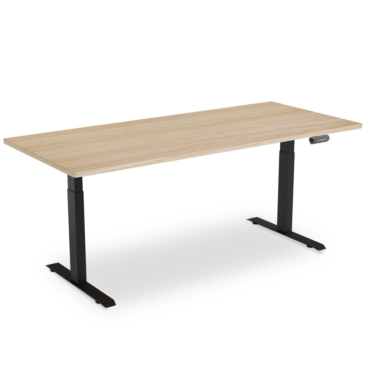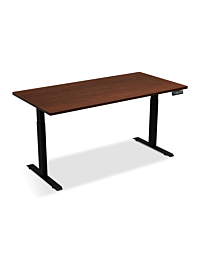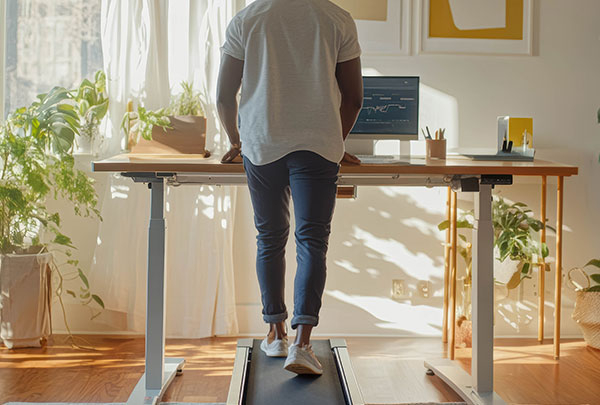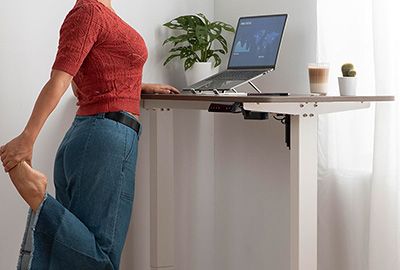Featured Product
Standing Desks Improve Your Wellbeing
These days, it’s easy and quite common to live a sedentary lifestyle. It’s especially challenging to stay active and move more when you have a job that requires you to sit a lot such as typing at a computer.
Given this, many companies and employees are becoming more interested in using standing desks and learning about the health benefits they may offer. The question that remains is, can standing desks improve your wellbeing and are they worth it. Continue reading to learn all the ways standing desks are better for your health.
Why it Matters
A standing desk becomes important in this case since the employer and employees suffer if the workers are not well or at risk for health issues. Many studies have shown over the years that sitting for extended periods each day and day in and day out can lead to serious health consequences such as heart disease, type 2 diabetes, stroke, and even cancer. Not only that but there are also more minor issues that arise such as dealing with neck and back pain.
The reason this is an important issue and why it matters is that when employees are in pain or fall ill their performance will not only be negatively impacted but there will likely be an increase in absences from work. All around this isn’t a good situation for the employer or the employee.
It’s even been said that sitting is as harmful as smoking when it comes to public health. Since sitting is literally killing people everywhere, there is a greater interest in coming up with solutions to this problem, and, hence, the standing desk comes into the picture.
So, can standing desks improve your wellbeing? Next, we’ll take a closer look at the standing desk health benefits and review the reasons why you may want to invest in one yourself or at least start advocating to have them at your workplace.
Can You Prevent Heart Disease & Obesity?
The truth is that when it comes to conducting research about if standing desks can notably prevent heart disease and obesity, the findings remain unclear. The Cochrane review of 2016 looked into this further and while there was no clear evidence of this particular link, there was a body of evidence that showed that standing desks can help in the fight against obesity and reduce back pain. When it comes to more serious problems, it’s hard to say.
However, what it does tell you is that the more time you spend at a standing desk, the less time you’re spending sitting overall, which will have a positive impact no matter who you are. A study done by The University Of Pittsburgh came to the same conclusion. The fact that heart disease affects older adults anyways makes it tough to draw any type of direct link or correlation between standing desks reducing the chance of heart disease. However, it’s safe to say that increasing standing time will reduce workers being absent from the office, which in turn will boost productivity and save companies money and billions of dollars in healthcare.
The long-term benefits may be a bit fuzzy and uncertain but many agree it has the potential to help with the fight against obesity and get people sitting less and dealing with less minor ailments. Using a standing desk makes you more active throughout the day which means you’ll avoid living a sedentary lifestyle and, therefore, can improve your health and wellbeing.
Should I Avoid Standing at My Desk All Day?
Another important question and matter to address is if it is bad to stand at your desk all day. Generally speaking, yes, it wouldn’t be ideal or good for you to stand at your desk all day every day and work. It would be very hard on you especially if you’re used to sitting all day. Standing part of your day is the sweet spot.
Doing so will increase blood flow, boost your metabolism, and you’ll experience fewer aches and pains overall. The best way to approach it is to stand for part of your day and continue to move around and change your positions and take breaks. If your goal is to burn more calories, then you’d want to use a balance board or walk on a treadmill as you work. Standing at your desk alone hasn’t been proven to help you burn extra calories. Also, focus on making your workstation and area ergonomically correct, which will benefit you as well.
Recommended Duration for Standing at A Desk?
Studies tend to conflict a bit about how long you should stand at a standing desk. The best way to approach this is to do what is best for you and your body. Pay attention to how you feel throughout the day and consider standing if you begin to have some back pain or neck aches as you work, as standing might help alleviate these discomforts. Either way, you should slowly phase a standing desk into your routine and if you want to increase your standing time then do so gradually. Adjust the height of your desk properly and then find the right balance for you.
Should I Get A Standing Desk?
There are certainly standing desk health benefits to take into consideration as you contemplate if getting a standing desk is worth it. The reality is that standing desks have the potential to greatly improve public health even if there is no conclusive evidence that suggests standing desks have a significant impact on offering long-term health benefits.
Conclusion
Anything you can do to reduce sitting all day at work and living a sedentary lifestyle will benefit you and the general public. Therefore, it’s wise and in your best interest to consider investing in a standing desk. The more active you are in a day and the less time you spend sitting the better. Anyone who is concerned about their health and performing well on the job should highly consider getting a standing desk to improve wellbeing.


 Buy Now, Pay Later
Buy Now, Pay Later Verified Rating
Verified Rating 






